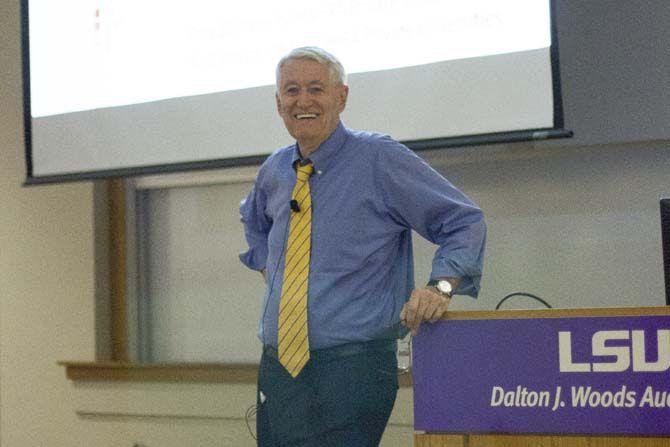Robert Birgeneau, co-chair of the Lincoln Project and former chancellor of the University of California, Berkeley, presented on the challenging state of public research universities Thursday in the Dalton J. Woods Auditorium.
The Lincoln Project is sponsored by the American Academy of Arts and Sciences and works to combat rampant state disinvestment in public research universities. The project analyzes the status of public research universities to assess methods of maintaining excellence and accessibility in the long term, Birgeneau said.
Public research universities are drivers of innovation and economic development in the United States. Of the top 50 venture capital and business producing universities worldwide, 20 are American public research universities, he said.
Aside from the monetary benefits, public research universities act as a conduit for lower income students to enter mainstream society and thrive, Birgeneau said.
“Public research universities are the single most effective mechanism for addressing the issue of income inequality, which has reached crisis proportions in the United States,” he said. “The gap between the rich and the poor is growing and growing in a way that is going to destabilize our society. We need healthy, well-functioning public research universities to have a stable and just society.”
If disinvestment continues, the danger of privatization increases, and public universities will offer less financial aid to low-income students, Birgeneau said. Lower income students will struggle to attain higher education and public research universities will no longer serve their purpose, he said.
Disinvestment has occurred for a number of reasons, he said.
Public education’s status among discretionary funding makes it one of the first areas targeted for cuts when states face financial challenges. Additionally, many state budgets are under increased pressure from programs such as Medicare, he said.
In 2013, 11 states allotted more money from the state general fund to corrections than to higher education. Corrections funding grew by 141 percent between 1986 and 2013, while higher education funding increased by 5.6 percent, according to the American Academy of Arts and Sciences.
Disinvestment is not solely a monetary issue, Birgeneau said. In recent decades, society’s perception of education has soured, and higher education is now predominantly perceived as a private good instead of a public good.
Louisiana has cut higher education spending by 41 percent between 2008 and 2014, the highest cuts in the country following the recession, according to a Young Invincibles report. Louisiana’s budget is facing an approximately $940 million shortfall, with higher education expecting a $70 million cut in the best-case scenario.
“I think that’s a very dangerous thing to do,” Birgeneau said. “The best professors are very mobile, so they can leave. They can go to other states. Building a great university like LSU takes a long time.”
Physics professor Ward Plummer agrees with Birgeneau. Plummer organized Birgeneau’s visit and said he believes Louisiana’s future spending decisions will impact the value of a University degree for years to come.
“If you have a degree from LSU, what’s going to happen in the next five to 10 years is going to really determine what that degree is worth,” Plummer said. “If we go in the right direction, there’s no doubt that an LSU degree can be worth more than it is now. If they close the University down, it will be worth nothing.”
Plummer said he thinks the state faces unique challenges compared to other universities. The state’s dependence on the oil and gas industry, and the mishandling of deficit calculations, has plagued the state and higher education for decades, Plummer said.
Plummer said he hopes exposing Birgeneau to these challenges will help further reflect Louisiana’s situation in the solutions the Lincoln Project is developing. Birgeneau is scheduled to meet with state legislators and the commission of higher education Friday, with Gov. John Bel Edwards possibly attending, Plummer said.
Government plays an integral role in resolving the problems facing higher education, Birgeneau said.
Educating people in positions of power who can influence budgets is one of the Lincoln Project’s main objectives. Several states have sent copies of the Lincoln Project’s publications to their legislators, he said.
The Lincoln Project recognizes the importance of politics in higher education, and has enlisted several former politicians to serve on the project’s board. Bipartisan politicians in Washington recognize the importance of discussing possible solutions, Birgeneau said.
Former Texas Sen. Kay Bailey Hutchison, a Republican, and former Rep. George Miller, a D – California, are helping develop federal strategy for the organization.
“Even though one is a moderate Republican and one is a fairly left wing Democrat, on education they agree,” Birgeneau said.
Duplicating this bipartisan support on a larger scale will be key in developing solutions to the crisis in higher education. The Lincoln Project is developing several strategies for improving higher education funding, including promoting partnerships between federal and state governments with foundations and individual philanthropists, he said.
Higher education expert discusses public research university funding
February 18, 2016
Former Chancellor of the University of California, Berkeley, Robert Birgeneau, discusses excellence and access in public higher education on Thursday, February 18, 2016 at Dalton Woods Auditorium.





